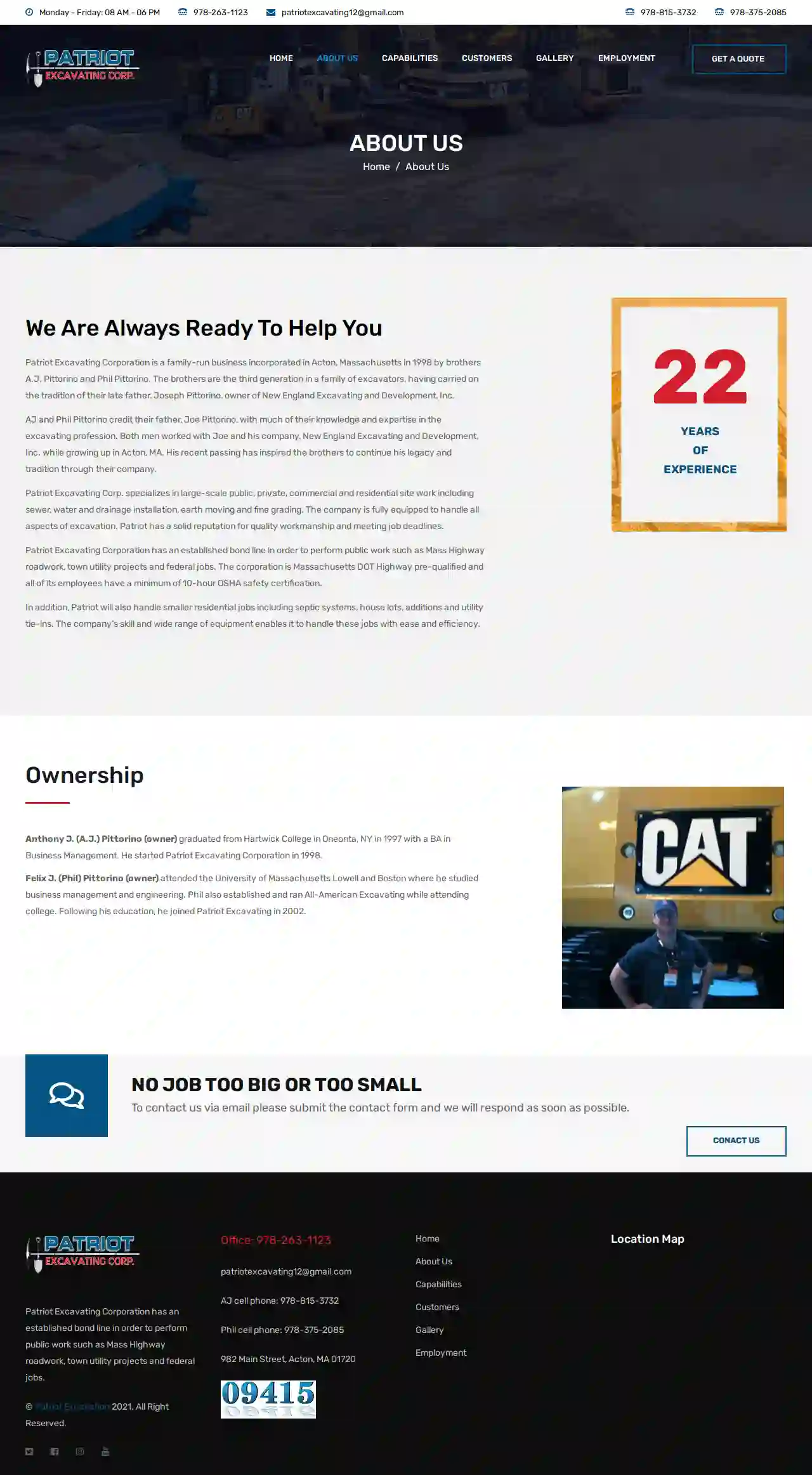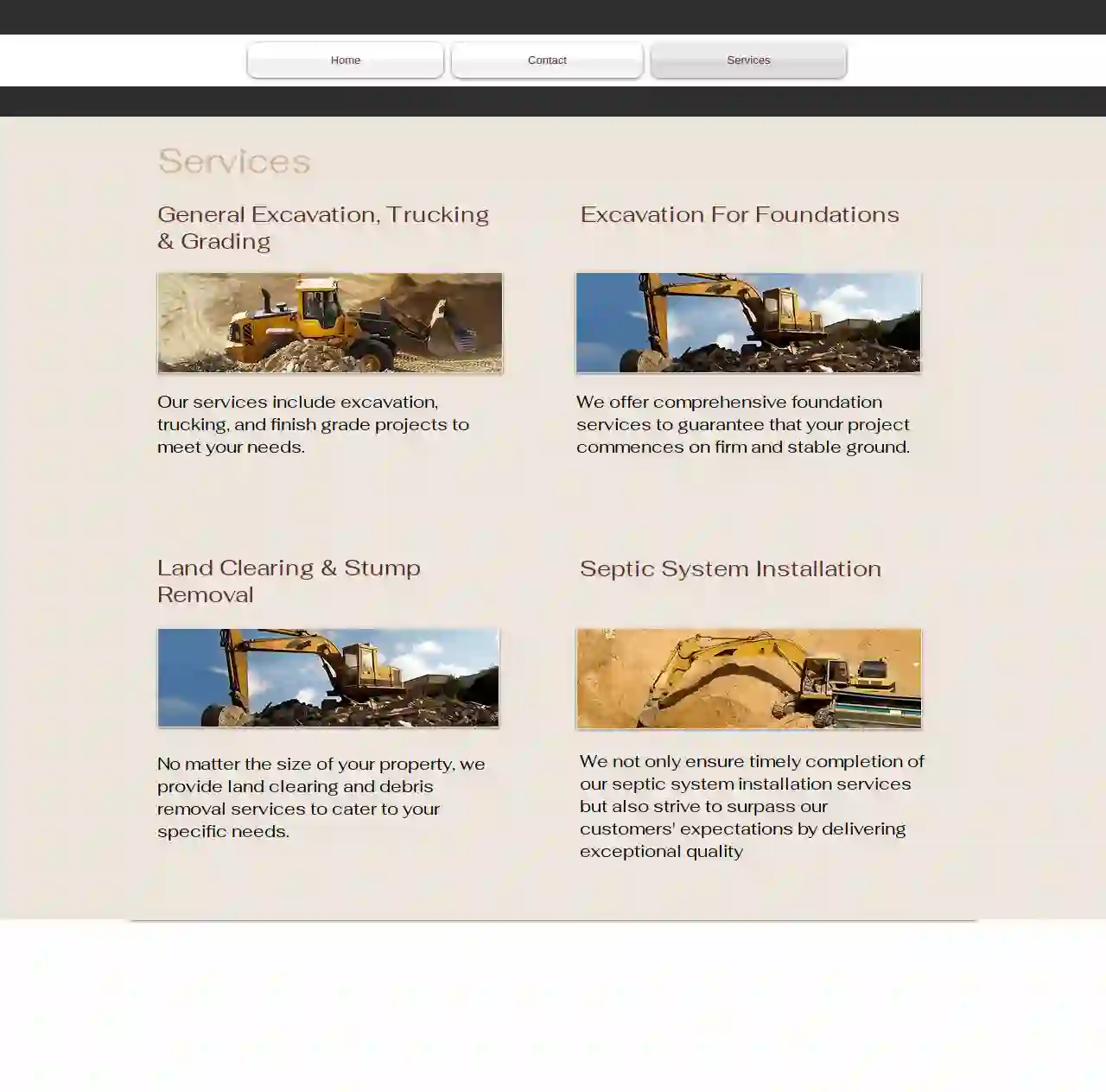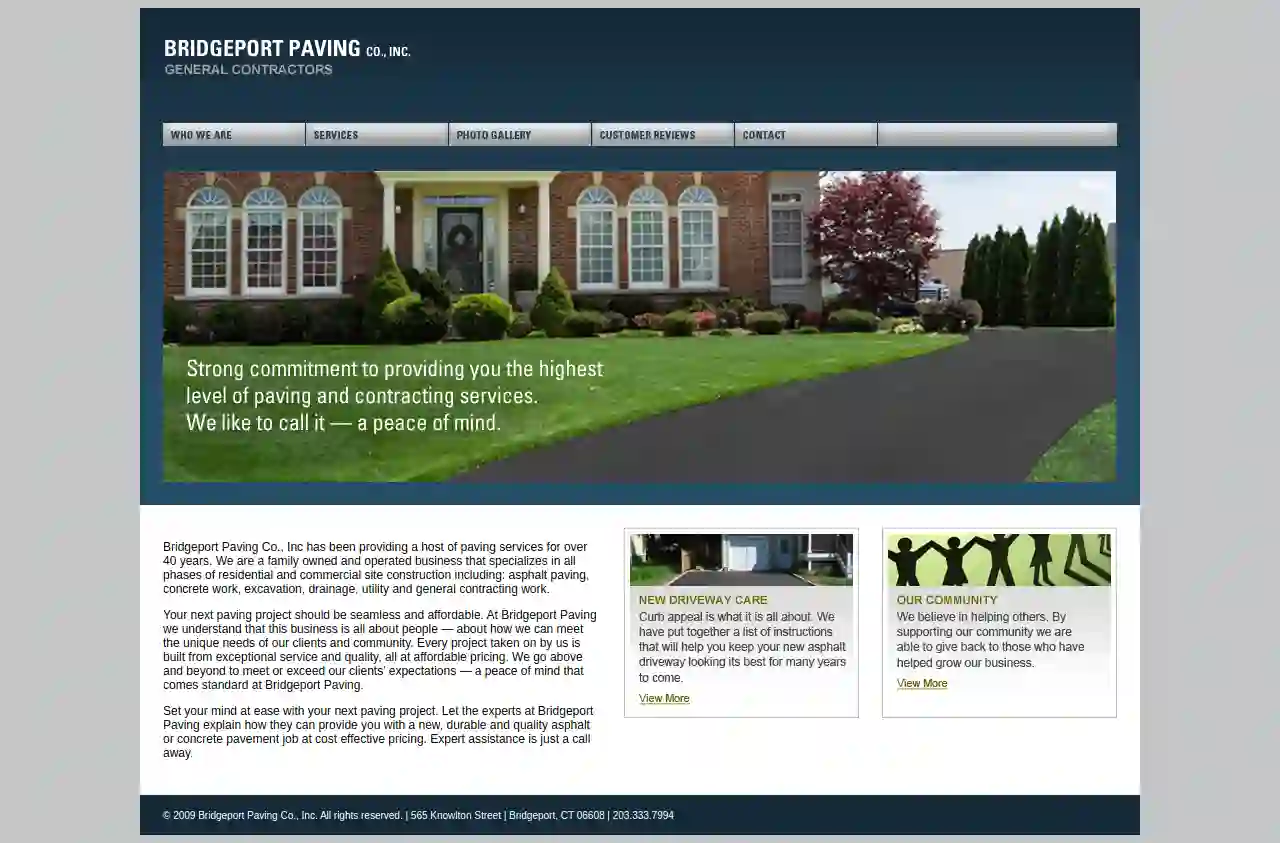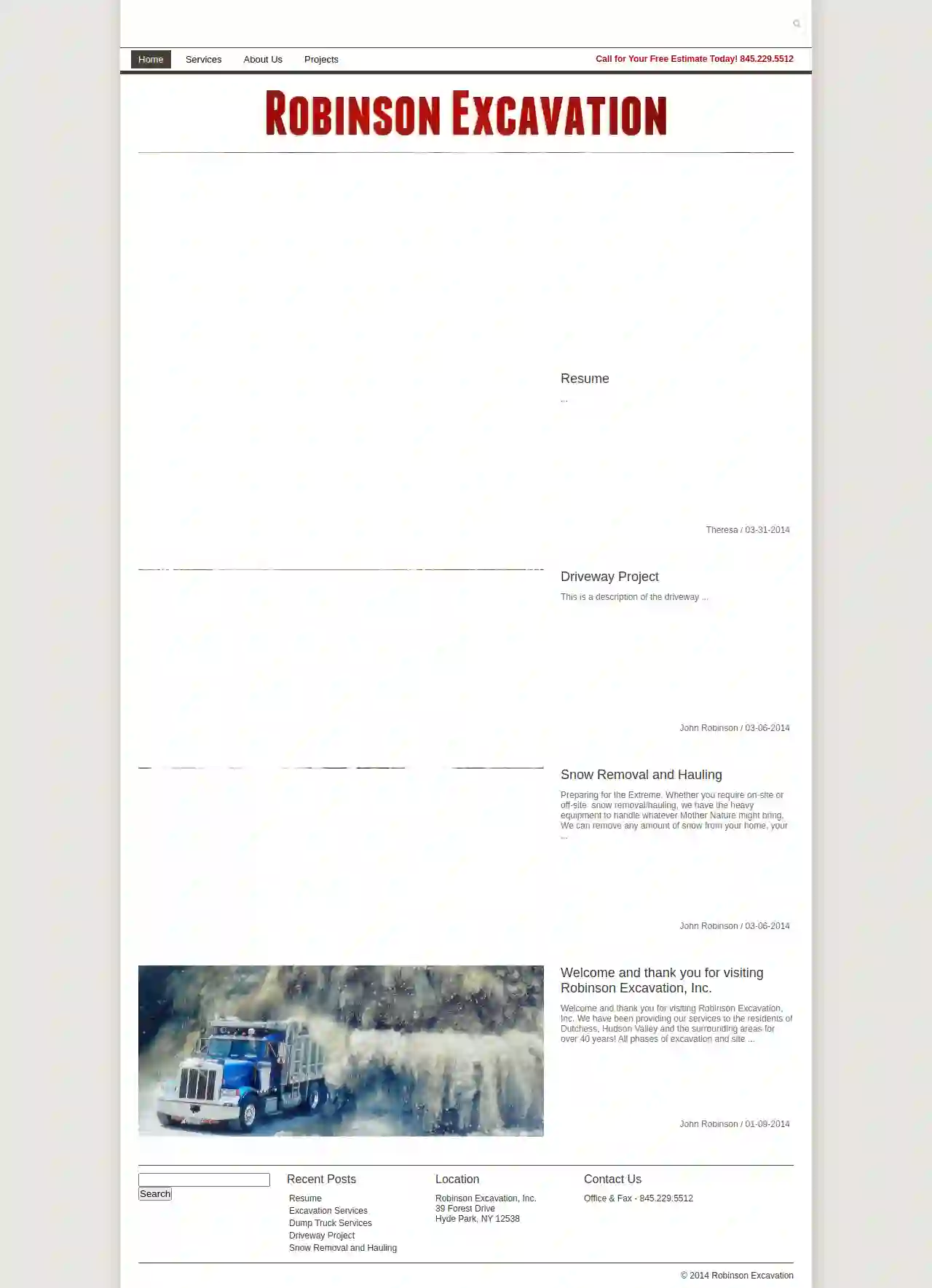Excavation Contractors Plaistow
Top Excavation Company Near Me in Plaistow
Receive 3 FREE Excavation Contractor quotes for your project today! Compare profiles, reviews, accreditations, portfolio, etc... and choose the best offer.

Patriot Excavation
982 Main Street, Acton, 01720, USAbout Us Patriot Excavating Corporation is a family-run business incorporated in Acton, Massachusetts in 1998 by brothers A.J. Pittorino and Phil Pittorino. They are the third generation in a family of excavators, carrying on the tradition of their late father, Joseph Pittorino, owner of New England Excavating and Development, Inc. A.J. and Phil Pittorino credit their father, Joe Pittorino, with much of their knowledge and expertise in the excavating profession. Both men worked with Joe and his company, New England Excavating and Development, Inc. while growing up in Acton, MA. His recent passing has inspired the brothers to continue his legacy and tradition through their company. Our Services Patriot Excavating Corp. specializes in large-scale public, private, commercial and residential site work including sewer, water and drainage installation, earth moving and fine grading. The company is fully equipped to handle all aspects of excavation. Patriot has a solid reputation for quality workmanship and meeting job deadlines. Patriot Excavating Corporation has an established bond line in order to perform public work such as Mass Highway roadwork, town utility projects and federal jobs. The corporation is Massachusetts DOT Highway pre-qualified and all of its employees have a minimum of 10-hour OSHA safety certification. In addition, Patriot will also handle smaller residential jobs including septic systems, house lots, additions and utility tie-ins. The company’s skill and wide range of equipment enables it to handle these jobs with ease and efficiency. Our Team Anthony J. (A.J.) Pittorino (owner) graduated from Hartwick College in Oneonta, NY in 1997 with a BA in Business Management. He started Patriot Excavating Corporation in 1998. Felix J. (Phil) Pittorino (owner) attended the University of Massachusetts Lowell and Boston where he studied business management and engineering. Phil also established and ran All-American Excavating while attending college. Following his education, he joined Patriot Excavating in 2002.
- Services
- Why Us?
- Our Team
- Gallery
Get Quote
Butts Bros Excavation LLC
51 reviewsNew Milford, 06776, USExcellence In Excavation When the people in our community need the expertise and professional oversight of an excavation contractor, they know to contact Butts Bros Excavation LLC. Whether you need someone to clear the land on a worksite, dig out a pond, or excavate for a home foundation, we can help you. Homeowners and skilled builders alike look to us for all their excavating needs—and the reasons why are obvious. Whether you’re most concerned with quick turnarounds, reasonable rates, or excellent results, you will surely love our approach to excavation. Book our services today for your upcoming project. Call (203) 994-5264 to schedule your consultation. Making Excavation Look Easy We are high-demand excavation contractors. Not a day goes by where we are not doing earthwork, digging trenches, or aiding the development of a new property. Over the years, we have come to understand the finer points of excavation better than the rest. We Serve the Customer We work in accordance with the standards of our trade, make no mistake. That said, we also believe in serving the customer every step of the way. We will listen to your requests, answer your questions, and address any concerns you might have. In the end, you get quality results and a customer experience like no other. Ready for Every Excavation Project Do you want to dig out a pond in the backyard of your home? Are you looking to clear a piece of property of large rocks and other masses? We can help you. Between our unparalleled expertise and vast storehouse of equipment, we can undertake just about any excavation project. Some of the services we offer include: Basement excavation Pond digging and filling Site clearing Trenches and troughs Foundation digging Grading And more Aiding Residential and Commercial Excavation Projects Since our company’s inception, we have had the opportunity to assist in projects of all varieties, from home building to commercial landscaping and everything in between. We tackle projects of all sizes—and what’s more, we treat every project with the seriousness it deserves. Would you like to learn a little more about us? Call our offices today. Your Excavation Is Always a Success with Us There are a lot of moving parts, crew members, and ongoing projects on any given worksite.
- Services
- Why Us?
- Gallery
Get Quote
Extreme Excavating Inc
4.710 reviews241 N Grant Street, Canby, 97013, USOREGON’S PREMIER EXCAVATION CONTRACTOR NOW PART OF THE CHARGE FAMILY OF BRANDS Extreme Excavating Company (EXC) specializes in underground utilities, commercial excavation, site prep, and other commercial contracting services. We provide complete solutions for utility providers in the most challenging environments, with more than 20 years of experience in the Pacific Northwest. Marquam Radial Feeder System The Marquam Radial scope expanded the Marquam substation to deliver service to Portland's South Waterfront, as well as accommodate future radial feeder getaways. Read More Quality Service and Craftsmanship EXC is committed to upholding high standards and establishing mutually beneficial contractor/client relationships. You can rely on us during all aspects of the project to deliver quality work on time and on budget. No exceptions! Learn about EXC Trusted and Knowledgeable EXC strives to be your go-to commercial contractor. It is our mission to provide the service possible and to be timely, efficient and knowledgeable. Your satisfaction is ours, and we will work tirelessly until it’s right. Learn about our capabilities Related Projects Lincoln High School, Portland, Oregon Pearl Apartments, Portland, Oregon
- Services
- Why Us?
- Gallery
Get Quote
Osburn Olson Excavation And Land Development
2207 Dolphin Rd, 2207 Dolphin Rd Warrenton, Warrenton, 97146, USOsburn Olson Excavation Osburn Olson Excavation stands as the premier land developer along the North Oregon Coast. Under the leadership of Ryan Osburn, the company boasts a team with over 50 years of collective experience in developing both residential and commercial projects. Going beyond the traditional scope of excavation, Osburn Olson Excavation offers a comprehensive array of services. These encompass residential home construction, commercial construction, site preparation, land clearing, demolition services, infrastructure development, utility installation, septic tank systems, block retaining wall construction, rock hauling, dirt hauling, site evaluation, and much more. If you seek a seasoned and professional excavation company with decades of expertise, we invite you to get in touch with us today. CORE VALUES Our goal is to provide the best quality services and the lowest possible prices. Our team of experts has over 50 years combined experience in the excavation and construction industry. As a leader in our field in the local area, our team will help you complete your project right the first time. We provide a variety of services including new home construction, excavation, utilities, drainage, retaining walls, block retaining walls, septic systems, and more. Osburn Olson Excavation has a large fleet of excavators for projects big and small. WE HAVE THE TOOLS From the biggest commercial projects to small single family homes, Osburn Olson has the right excavator and tools for the job. CERTIFIED EXPERIENCE With decades of experience in the construction industry, our certified excavation experts will get your job done right the first time. COMPETITIVE PRICING After decades in the construction field, we know how to keep our pricing low to save you money. QUALITY GUARANTEE Rest assured that our team will get your excavation or construction project done right the first time. 50 YEARS EXPERIENCE Our team of construction experts have over 50 years experience building on the Oregon Coast. LASTING RESULTS Over the years we have learned what works and what doesn’t on the Oregon Coast. Site grading and excavation are critical to the success of your construction project.
- Services
- Why Us?
- Our Team
- Gallery
Get Quote
High Idle Excavation
Farmingdale, USIntroducing High Idle Excavation Finding a reliable excavation contractor is crucial to the success of your project. Our experienced team at High Idle Excavation is here to make the process smooth and straightforward, turning your vision into reality with precision and efficiency. Based in Farmingdale, NY, we pride ourselves on being a locally owned and operated business, dedicated to delivering top-quality excavation services for residential and commercial clients. We offer an extensive range of services, which include expert land clearing, detailed site preparation, and precise grading and regrading. Whether you're looking to clear snow, or remove a parking lot or pool, we have the expertise and equipment to get the job done right. Our trenching and utility work ensure that your infrastructure projects are in capable hands, while our bobcat and demolition services provide the heavy-duty solutions needed for larger tasks. What sets us apart is having a comprehensive service portfolio and unwavering dedication to customer satisfaction. We offer free estimates and 24/7 emergency service calls, so no matter the time or the challenge, we're here for you. Our commitment to affordable, high-quality work means you get the best value without compromising on excellence. With a focus on friendly customer service and rapid project completion, we aim to make your excavation needs manageable and stress-free. Licensed and insured, High Idle Excavation stands ready to tackle all your excavation challenges with the professionalism and care you deserve. If you need top-notch excavation services in Farmingdale, NY, from site clearing to construction demolition, we invite you to reach out to us. Let us help turn your improvement plans into reality. Contact High Idle Excavation today to get started. Our Services Tackle your excavation project with confidence by calling High Idle Excavation at (516) 988-6600. Discover why we are the trusted excavator in Farmingdale, NY. Let's transform your property into a more usable space today! * Excavation Contractor * Excavating Services * Land Clearing * Snow Removal * Parking Lot Rip Outs * Pool Rip Outs * Trenching * Utility Work * Site Clearing * Demolition Services * Bobcat Services * Land Demolition * Grading Services * Regrading Services * Resloping Services * Site Preparation * Building Site Preparation * Construction Site Preparation * Construction Demolition * Equipment Rental * Equipment Transportation
- Services
- Why Us?
- Gallery
Get Quote
Coastline Excavation Plymouth, Ma
51 reviewsPlymouth, USCoastline Excavation: Your Trusted Partner for Excavation, Trucking, and Grading Coastline Excavation is a reputable company dedicated to providing high-quality excavation, trucking, and grading services to meet your project needs. We understand the importance of a solid foundation for any construction project, and our team of experienced professionals is committed to delivering exceptional results. From initial site preparation to final grading, we handle every aspect of your project with precision and care. Our modern equipment and skilled operators ensure efficient and timely completion, minimizing disruption to your schedule. We take pride in our commitment to customer satisfaction. Our team is dedicated to providing clear communication, competitive pricing, and a personalized approach to every project. We work closely with our clients to understand their specific requirements and ensure their complete satisfaction.
- Services
- Why Us?
- Gallery
Get Quote
Bridgeport Paving Co Inc
3.52 reviews565 Knowlton Street, Bridgeport, 06608, USBridgeport Paving Co., Inc. has been providing a host of quality paving services for over 40 years. We are a family owned and operated business that specializes in all phases of residential and commercial site construction including: asphalt paving, concrete work, excavation, drainage, utility and general contracting work. Your next paving project should be seamless and affordable. At Bridgeport Paving we understand that this business is all about people — about how we can meet the unique needs of our clients and community. Every project taken on by us is built from exceptional service and quality, all at affordable pricing. We go above and beyond to meet or exceed our clients' expectations — a peace of mind that comes standard at Bridgeport Paving. Set your mind at ease with your next paving project. Let the experts at Bridgeport Paving explain how they can provide you with a new, durable and quality asphalt or concrete pavement job at cost effective pricing. Expert assistance is just a call away.
- Services
- Why Us?
- Testimonials
- Gallery
Get Quote
Hal's Construction
4.536 reviews20666 S. Highway 213, Oregon City, 97045, USPracticed, Year-Round Paving Construction in Portland, OR Turn to the experienced services of Hal’s Construction, Inc. for your paving needs. A family-owned business, Hal’s Construction, Inc. can provide you with experienced, loyal employees who provide quality work in a variety of services. We provide year-round paving services—summer or winter, rain or shine. During the winter months, we work on good weather days so we can provide you with top service. Hal’s Construction, Inc. is focused on quality of work and meaningful customer relationships, providing specialty services to your specific needs. With Hal’s Construction, we see our employees as one large team aiming for the same goal. Our employees are not afraid to help each other when one crew is done with a task and the other crew is still finishing another task. With a low turnover employee rate, we are proud of our experienced, dedicated employees. This, in turn, allows us to provide the best quality and custom services to you. Whatever you need done, whether large or small, we can provide the same standards of experience, quality, and professionalism we bring to every project. Your project is important to us. Let us use our years of experience and reputation for quality for your paving project. We want to establish a relationship of trust with you. Our trucks and equipment are always maintained and cleaned for each job. Our employees are professional, honest, and punctual. We know how important first impressions are, and we want to impress you. At Hal’s Construction Inc., it is our goal to serve the community with quality workmanship and superior customer service, while providing a safe working environment for our skilled specialists. Our employees’ experience and commitment to service excellence sets the bar for commercial and residential paving, excavation, and construction work. So whether you need a driveway or parking lot paved, call Hal’s Construction today at (503) 226-4999 for paving construction in Oregon City, OR. You may also fill out our contact form on the Contact Us page.
- Services
- Why Us?
- Gallery
Get Quote
Robinson Excavation, Inc.
51 reviews39 Forest Drive, Hyde Park, 12538, USRobinson Excavation, Inc. - Your Trusted Excavation Partner in Dutchess County and Beyond For over 40 years, Robinson Excavation, Inc. has been a trusted name in Dutchess County, Hudson Valley, and surrounding areas. We are a family-owned and operated business dedicated to providing high-quality excavation and site work services for both residential and commercial clients. Our commitment to excellence, combined with our extensive experience, ensures that every project is completed to the highest standards. We understand that excavation projects can be complex and require a skilled and experienced team. That's why we have assembled a team of dedicated professionals who are passionate about delivering exceptional results. From initial planning to final completion, we work closely with our clients to ensure their vision is realized. We are fully insured and equipped to handle all phases of excavation and site work, no matter how big or small the project. Our services include: - Fix muddy driveways - Fix and replace failing septic systems - Place new septic systems - Municipal water and sewer lines (Town or City) - Footing drains - Dry wells - New foundations - Demolition - Blasting - Trucking - Paving - Delivery of shale, Item 4, all size stone, fill, and topsoil - Complete dump truck service - And much more… We are committed to providing our clients with the highest level of service and satisfaction. We believe in open communication, transparency, and working closely with our clients to ensure their needs are met. Contact us today for a free quote and let us help you bring your project to life.
- Services
- Why Us?
- Gallery
Get Quote
Orlando Excavation Corp.
54 reviews155 Main Street, Southborough, 01722, USWelcome to Orlando Construction Corp. We take a personal, customized approach with our customers. We are a renown local excavating contractor based in Southborough, MA with over 20 years of experience. Whether it’s a complete site grading, a new septic install, demolition of a large commercial or residential structure, installation of drainage or catch basins, a large retaining wall, a new asphalt parking lot or driveway or a large hardscape project, we take great care and pride in the work we do for you. We are equipped to meet all your project management needs and are committed to delivering the best in quality, service, safety and reliability our clients expect and deserve. The Right Choice… Renown Industry Leader Honest and Trustworthy Service Over 20 Years Experience Free Consultations Fully Licensed, Insured & Bonded We value our customers and are dedicated to serving you See What Our Clients Are Saying… “I am very pleased with the sitework Orlando Construction helped us with on our house lot! Thanks again to Orlando Construction for the great work and for answering all of our questions and concerns along the way. I will definitely be using Orlando Construction again and will recommend them without hesitation!” – Boxborough, MA
- Services
- Why Us?
- Our Team
- Testimonials
- Gallery
Get Quote
Over 22,076+ Excavation Contractors on our directory
Our excavation providers operate in Plaistow & surroundings!
ExcavationHQ has curated and vetted the Best Excavation Companies near Plaistow. Find the most reliable pro today.
Frequently Asked Questions About Excavation Contractors
- Clearly Define the Scope: Outline the project's goals, including the excavation area, depth, grade, and intended use.
- Obtain Necessary Permits: Research and acquire any required permits from your local authorities.
- Mark Utility Lines: Contact your utility companies to locate and mark underground utilities to prevent damage.
- Communicate with Neighbors: Inform your neighbors about the project's timeline and potential noise or disruptions.
- Prepare the Site: Clear any obstacles, such as vegetation, furniture, or structures, from the excavation area.
- Discuss Safety Protocols: Review safety procedures with the contractor to ensure a safe work environment.
- Topsoil Removal: Stripping the fertile topsoil layer from a site, often preserving it for landscaping.
- Trench Excavation: Digging long, narrow trenches for utilities (pipes, cables) or foundations.
- Basement Excavation: Removing earth to create a space for a basement beneath a structure.
- Pool Excavation: Digging a precise hole for installing a swimming pool.
- Roadway Excavation: Removing earth and preparing the ground for road construction.
- Demolition Excavation: Clearing debris and preparing the site after demolition.
- Channel Excavation: Creating channels for drainage or irrigation.
- Planning and Surveying: Defining the excavation area, marking utility lines, and determining the required depth and grade.
- Site Preparation: Clearing vegetation, removing obstacles, and ensuring site accessibility.
- Excavation: Using appropriate equipment (excavators, backhoes, etc.) to remove earth and create the desired excavation.
- Hauling and Disposal: Transporting excavated material to designated disposal sites, complying with environmental regulations.
- Backfilling and Compaction: Refilling the excavation with suitable material and compacting it to achieve the required density and stability.
- Grading and Finishing: Leveling and shaping the surface to the final grade for landscaping or construction.
- Excavations Deeper Than a Certain Depth: This varies by jurisdiction, usually around 5 feet.
- Excavations Near Utilities: Digging near buried utilities (gas, water, electric) often requires permits and utility locates to prevent damage.
- Excavations Affecting Public Property: Projects impacting sidewalks, roads, or other public areas typically require permits.
- Excavations in Environmentally Sensitive Areas: Projects in wetlands, floodplains, or other sensitive areas might need special permits.
What should I do before excavation starts?
What are the different types of excavation?
What is the excavation process?
Do I need a permit for excavation?
What should I do before excavation starts?
- Clearly Define the Scope: Outline the project's goals, including the excavation area, depth, grade, and intended use.
- Obtain Necessary Permits: Research and acquire any required permits from your local authorities.
- Mark Utility Lines: Contact your utility companies to locate and mark underground utilities to prevent damage.
- Communicate with Neighbors: Inform your neighbors about the project's timeline and potential noise or disruptions.
- Prepare the Site: Clear any obstacles, such as vegetation, furniture, or structures, from the excavation area.
- Discuss Safety Protocols: Review safety procedures with the contractor to ensure a safe work environment.
What are the different types of excavation?
- Topsoil Removal: Stripping the fertile topsoil layer from a site, often preserving it for landscaping.
- Trench Excavation: Digging long, narrow trenches for utilities (pipes, cables) or foundations.
- Basement Excavation: Removing earth to create a space for a basement beneath a structure.
- Pool Excavation: Digging a precise hole for installing a swimming pool.
- Roadway Excavation: Removing earth and preparing the ground for road construction.
- Demolition Excavation: Clearing debris and preparing the site after demolition.
- Channel Excavation: Creating channels for drainage or irrigation.
What is the excavation process?
- Planning and Surveying: Defining the excavation area, marking utility lines, and determining the required depth and grade.
- Site Preparation: Clearing vegetation, removing obstacles, and ensuring site accessibility.
- Excavation: Using appropriate equipment (excavators, backhoes, etc.) to remove earth and create the desired excavation.
- Hauling and Disposal: Transporting excavated material to designated disposal sites, complying with environmental regulations.
- Backfilling and Compaction: Refilling the excavation with suitable material and compacting it to achieve the required density and stability.
- Grading and Finishing: Leveling and shaping the surface to the final grade for landscaping or construction.
Do I need a permit for excavation?
- Excavations Deeper Than a Certain Depth: This varies by jurisdiction, usually around 5 feet.
- Excavations Near Utilities: Digging near buried utilities (gas, water, electric) often requires permits and utility locates to prevent damage.
- Excavations Affecting Public Property: Projects impacting sidewalks, roads, or other public areas typically require permits.
- Excavations in Environmentally Sensitive Areas: Projects in wetlands, floodplains, or other sensitive areas might need special permits.